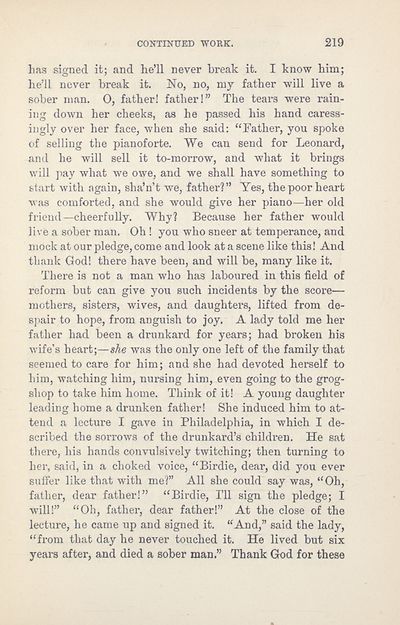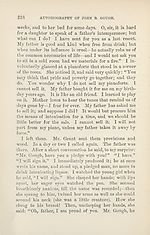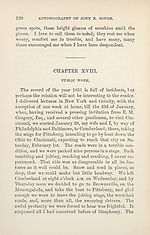Download files
Complete book:
Individual page:
Thumbnail gallery: Grid view | List view

CONTINUED WORK.
219
has signed it; and he’ll never break it. I know him;
he’ll never break it. No, no, my father will live a
sober man. 0, father! father!” The tears were rain¬
ing down her cheeks, as he passed his hand caress¬
ingly over her face, when she said: “Father, you spoke
of selling the pianoforte. We can send for Leonard,
and he will sell it to-morrow, and what it brings
will pay what we owe, and we shall have something to
start with again, sha’n’t we, father?” Yes, the poor heart
was comforted, and she would give her piano—her old
friend—cheerfully. Why? Because her father would
live a sober man. Oh ! you who sneer at temperance, and
mock at our pledge, come and look at a scene like this! And
thank God! there have been, and will be, many like it.
There is not a man who has laboured in this field of
reform but can give you such incidents by the score—
mothers, sisters, wives, and daughters, lifted from de¬
spair to hope, from anguish to joy. A lady told me her
father had been a drunkard for years; had broken his
wife’s heart;—she was the only one left of the family that
seemed to care for him; and she had devoted herself to
him, watching him, nursing him, even going to the grog-
sliop to take him home. Think of it! A young daughter
leading home a drunken father! She induced him to at¬
tend a lecture I gave in Philadelphia, in which I de¬
scribed the sorrows of the drunkard’s children. He sat
there, his hands convulsively twitching; then turning to
her, said, in a choked voice, “Birdie, dear, did you ever
suffer like that with me?” All she could say was, “Oh,
father, dear father!” “Birdie, I’ll sign the pledge; I
will!” “Oh, father, dear father!” At the close of the
lecture, he came up and signed it. “And,” said the lady,
“from that day he never touched it. He lived but six
years after, and died a sober man.” Thank God for these
219
has signed it; and he’ll never break it. I know him;
he’ll never break it. No, no, my father will live a
sober man. 0, father! father!” The tears were rain¬
ing down her cheeks, as he passed his hand caress¬
ingly over her face, when she said: “Father, you spoke
of selling the pianoforte. We can send for Leonard,
and he will sell it to-morrow, and what it brings
will pay what we owe, and we shall have something to
start with again, sha’n’t we, father?” Yes, the poor heart
was comforted, and she would give her piano—her old
friend—cheerfully. Why? Because her father would
live a sober man. Oh ! you who sneer at temperance, and
mock at our pledge, come and look at a scene like this! And
thank God! there have been, and will be, many like it.
There is not a man who has laboured in this field of
reform but can give you such incidents by the score—
mothers, sisters, wives, and daughters, lifted from de¬
spair to hope, from anguish to joy. A lady told me her
father had been a drunkard for years; had broken his
wife’s heart;—she was the only one left of the family that
seemed to care for him; and she had devoted herself to
him, watching him, nursing him, even going to the grog-
sliop to take him home. Think of it! A young daughter
leading home a drunken father! She induced him to at¬
tend a lecture I gave in Philadelphia, in which I de¬
scribed the sorrows of the drunkard’s children. He sat
there, his hands convulsively twitching; then turning to
her, said, in a choked voice, “Birdie, dear, did you ever
suffer like that with me?” All she could say was, “Oh,
father, dear father!” “Birdie, I’ll sign the pledge; I
will!” “Oh, father, dear father!” At the close of the
lecture, he came up and signed it. “And,” said the lady,
“from that day he never touched it. He lived but six
years after, and died a sober man.” Thank God for these
Set display mode to:
![]() Universal Viewer |
Universal Viewer | ![]() Mirador |
Large image | Transcription
Mirador |
Large image | Transcription
| Antiquarian books of Scotland > Temperance > Autobiography and personal recollections of John B. Gough > (231) |
|---|
| Permanent URL | https://digital.nls.uk/125990141 |
|---|
| Description | Thousands of printed books from the Antiquarian Books of Scotland collection which dates from 1641 to the 1980s. The collection consists of 14,800 books which were published in Scotland or have a Scottish connection, e.g. through the author, printer or owner. Subjects covered include sport, education, diseases, adventure, occupations, Jacobites, politics and religion. Among the 29 languages represented are English, Gaelic, Italian, French, Russian and Swedish. |
|---|

